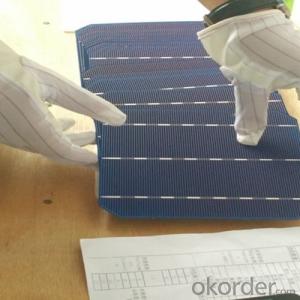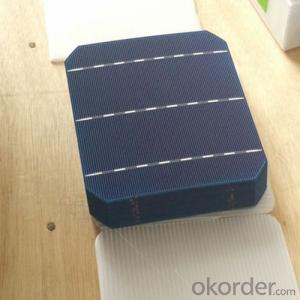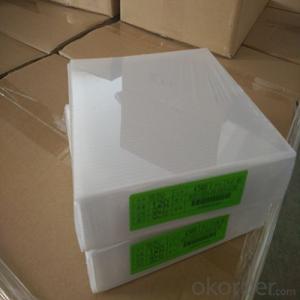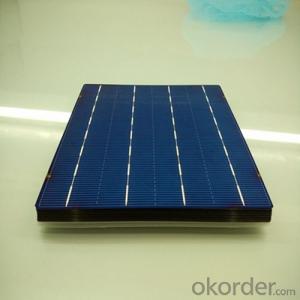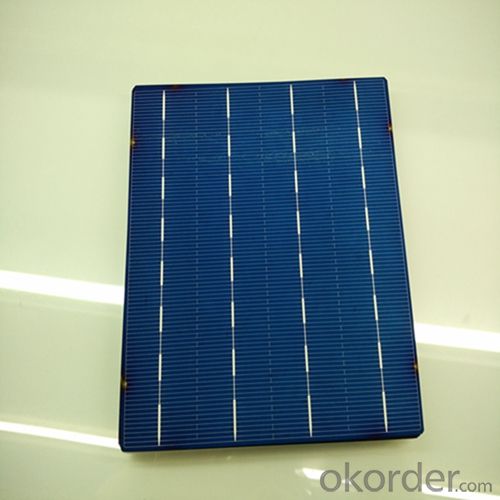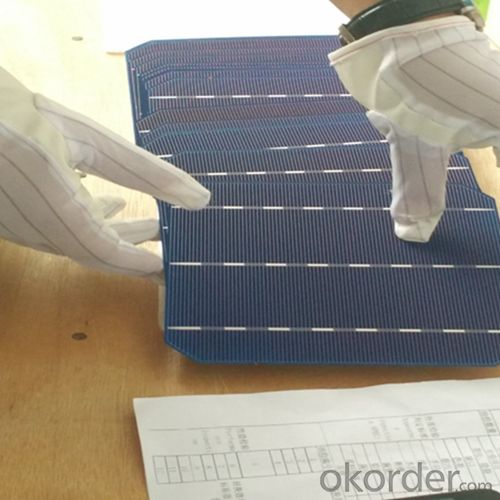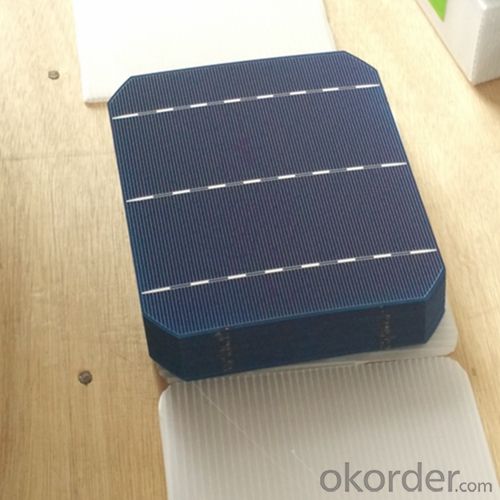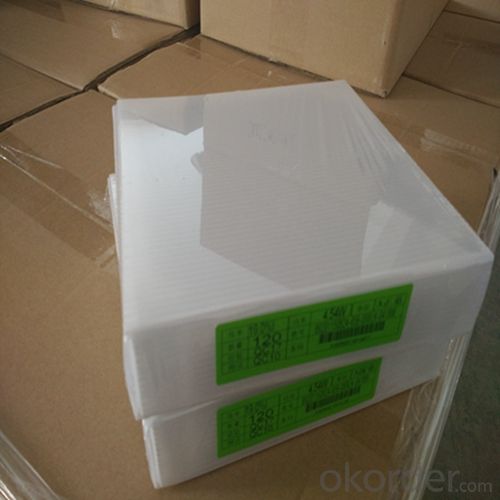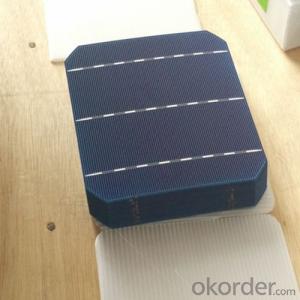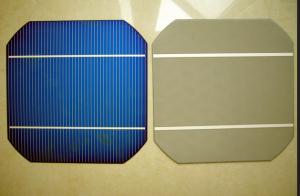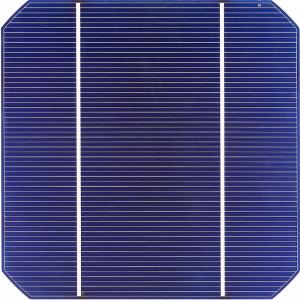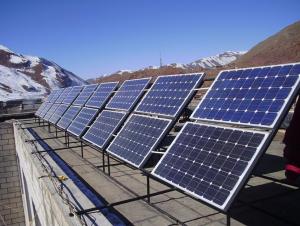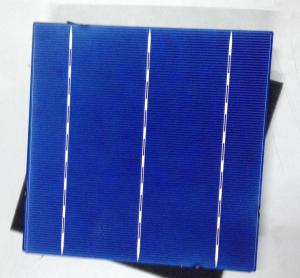Bulk Heterojunction Organic Solar Cells - Poly 156x156mm2 Solar Cells Made in Class BB
- Loading Port:
- Shanghai
- Payment Terms:
- TT OR LC
- Min Order Qty:
- 6500 watt
- Supply Capability:
- 6000000 watt/month
OKorder Service Pledge
OKorder Financial Service
You Might Also Like
The operation of a photovoltaic (PV) cell requires 3 basic attributes:
The absorption of light, generating either electron-hole pairs or excitons.
The separation of charge carriers of opposite types.
The separate extraction of those carriers to an external circuit.
In contrast, a solar thermal collector supplies heat by absorbing sunlight, for the purpose of either direct heating or indirect electrical power generation from heat. A "photoelectrolytic cell" (photoelectrochemical cell), on the other hand, refers either to a type of photovoltaic cell (like that developed by Edmond Becquerel and modern dye-sensitized solar cells), or to a device that splits water directly into hydrogen and oxygen using only solar illumination.Characteristic of Mono 156X156MM2 Solar Cells
You are gaining energy independence - add battery backup power for even greater energy security
The cost of electricity is only going to rise – insure against that rising cost
Adaptive cells change their absorption/reflection characteristics depending to respond to environmental conditions. An adaptive material responds to the intensity and angle of incident light. At the part of the cell where the light is most intense, the cell surface changes from reflective to adaptive, allowing the light to penetrate the cell. The other parts of the cell remain reflective increasing the retention of the absorbed light within the cell.[67]
In 2014 a system that combined an adaptive surface with a glass substrate that redirect the absorbed to a light absorber on the edges of the sheet. The system also included an array of fixed lenses/mirrors to concentrate light onto the adaptive surface. As the day continues, the concentrated light moves along the surface of the cell. That surface switches from reflective to adaptive when the light is most concentrated and back to reflective after the light moves along
Mechanical data and design
Format | 156mm x 156mm±0.5mm |
Thickness | 210μm±40μm |
Front(-) | 1.5mm bus bar (silver),blue anti-reflection coating (silicon nitride) |
Back (+) | 2.5mm wide soldering pads (sliver) back surface field (aluminium) |
Temperature Coefficient of Cells
Voc. Temp.coef.%/K | -0.35% |
Isc. Temp.coef .%/K | +0.024%/K |
Pm.Temp.coef. %/K | -0.47%/K |
Electrical Characteristic
Effiency(%) | Pmpp(W) | Umpp(V) | Impp(A) | Uoc(V) | Isc(A) | FF(%) |
18.35 | 4.384 | 0.526 | 8.333 | 0.63 | 8.877 | 78.39% |
18.20 | 4.349 | 0.526 | 8.263 | 0.63 | 8.789 | 78.54% |
18.05 | 4.313 | 0.525 | 8.216 | 0.63 | 8.741 | 78.32% |
17.90 | 4.277 | 0.524 | 8.161 | 0.625 | 8.713 | 78.04% |
17.75 | 4.241 | 0.523 | 8.116 | 0.625 | 8.678 | 77.70% |
17.60 | 4.206 | 0.521 | 8.073 | 0.625 | 8.657 | 77.36% |
17.45 | 4.170 | 0.519 | 8.039 | 0.625 | 8.633 | 76.92% |
17.30 | 4.134 | 0.517 | 8.004 | 0.625 | 8.622 | 76.59% |
17.15 | 4.096 | 0.516 | 7.938 | 0.625 | 8.537 | 76.80% |
17.00 | 4.062 | 0.512 | 7.933 | 0.625 | 8.531 | 76.18% |
16.75 | 4.002 | 0.511 | 7.828 | 0.625 | 8.499 | 75.34% |
16.50 | 3.940 | 0.510 | 7.731 | 0.625 | 8.484 | 74.36% |
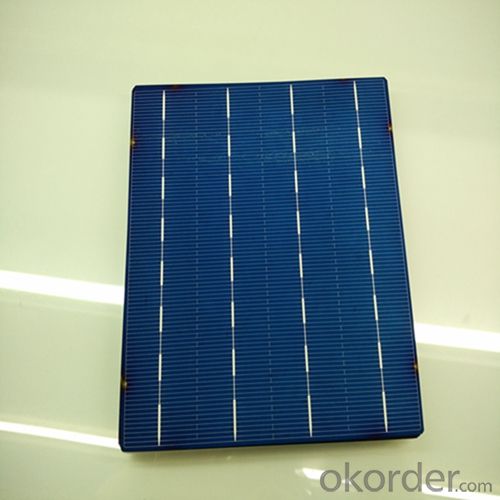
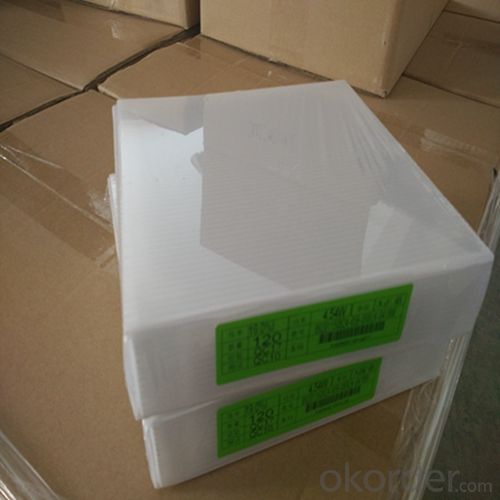
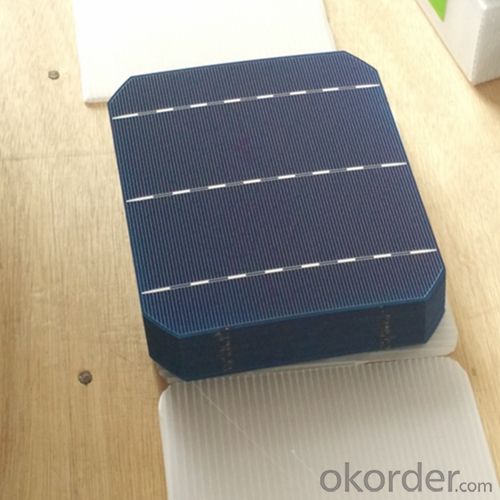
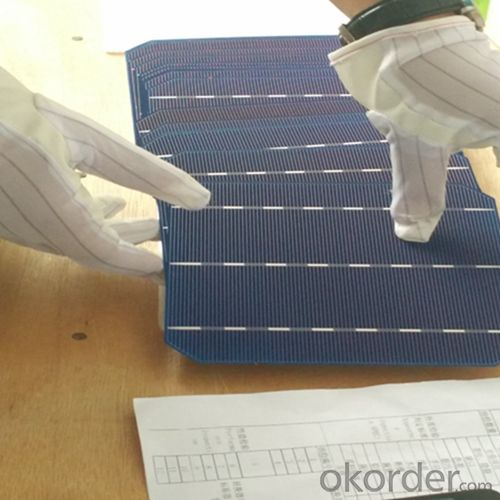
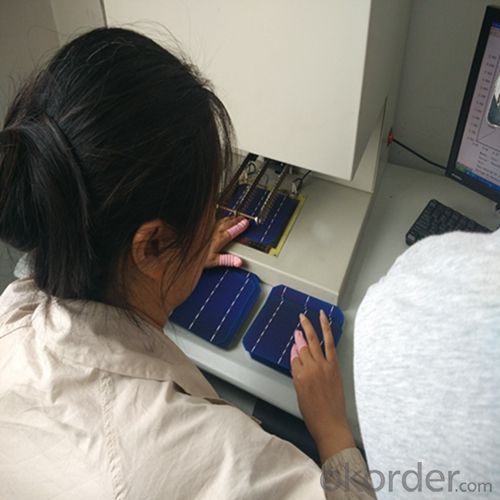 FAQ
FAQ
Q: What price for each watt?
A: It depends on the quantity, delivery date and payment terms, generally Large Quantity and Low Price
Q: What is your size for each module? Can you tell me the Parameter of your module?
A: We have different series of panels in different output, both c-Si and a-Si. Please take the specification sheet for your reference.
Q: What is your size for each module? Can you tell me the Parameter of your module?
A: We have different series of panels in different output, both c-Si and a-Si. Please take the specification sheet for your reference.
- Q: Can solar cells be used for powering water treatment plants?
- Yes, solar cells can be used for powering water treatment plants. Solar energy can be harnessed and converted into electricity to power the various processes and equipment required for water treatment. This renewable energy source offers a sustainable and environmentally friendly solution for powering water treatment plants.
- Q: 24V 200W solar cells can charge 12V battery?
- The 200-watt battery short-circuit current is almost 12-15 amps, with the battery board connected to the 12-volt 100-hour battery charge current is almost 8-10 amps, just easy to use.
- Q: Briefly explain why solar cells are made into components
- Components are made in order to better protect the crystalline silicon material is not destroyed, the components generally by the tempered glass, EVA, battery, TPT, aluminum frame and other materials, so that the components, the service life of up to 20 years The
- Q: Can solar cells be used for heating?
- Yes, solar cells can be used for heating through a process called solar thermal heating.
- Q: Can solar cells be used in mining operations?
- Yes, solar cells can be used in mining operations. They can be employed to power various equipment and machinery used in mining processes, such as lighting, ventilation systems, pumps, and conveyor belts. Solar energy can also be used to generate electricity for on-site offices and facilities, reducing the reliance on traditional energy sources and minimizing the environmental impact of mining activities. Additionally, the use of solar cells in mining operations can contribute to cost savings and improve the overall sustainability of the mining industry.
- Q: Can solar cells be used in clothing?
- Yes, solar cells can be used in clothing.
- Q: What is the usage of solar cells?
- Solar cells were first used as as an alternative power source to the primary battery power source.
- Q: Can solar cells be used in off-grid water desalination?
- Yes, solar cells can be used in off-grid water desalination. Solar energy can power the desalination process, typically through a combination of solar panels and a renewable energy storage system. This allows for the conversion of saltwater into fresh water without the need for a connection to the electrical grid. The energy from the sun is harnessed, stored, and utilized to run the desalination equipment, making it a sustainable and environmentally friendly solution for off-grid water desalination.
- Q: How can I buy the solar cells wholesale ?
- You can send your bidding terms to many solar cell factories by email, and let them quote the price for you. You can decide which company that gives you the best wholesale price.
- Q: Can solar cells be used in concert venues?
- Yes, solar cells can be used in concert venues. They can be installed on the rooftops, facades, or parking areas of concert venues to generate clean and renewable electricity. Solar energy can power various aspects of the venue, such as lighting, sound systems, and other electrical equipment, reducing the reliance on traditional energy sources and lowering carbon emissions. Additionally, solar panels can be integrated into portable structures to provide power for outdoor concerts and festivals.
Send your message to us
Bulk Heterojunction Organic Solar Cells - Poly 156x156mm2 Solar Cells Made in Class BB
- Loading Port:
- Shanghai
- Payment Terms:
- TT OR LC
- Min Order Qty:
- 6500 watt
- Supply Capability:
- 6000000 watt/month
OKorder Service Pledge
OKorder Financial Service
Similar products
Hot products
Hot Searches
Related keywords

